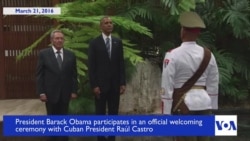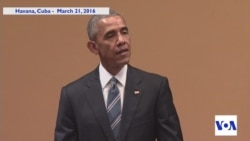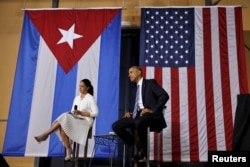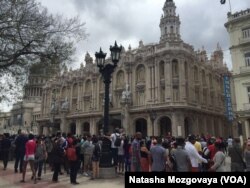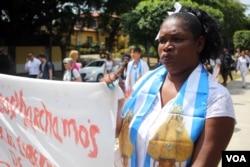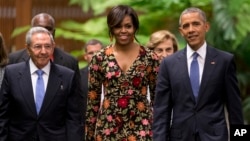U.S. President Barack Obama Monday hailed the progress in relations between the United States and Cuba, while acknowledging that the two sides continue to have "very serious" differences on democracy and human rights.
After "frank and candid" talks in Havana on ways to advance normalization efforts, Obama and Cuban President Raul Castro held a joint news conference.
"This is a time of hope for Cuba," Obama told reporters.
'Decided by Cubans'
The U.S. leader said while he made it "clear" to Castro that the U.S. would continue to speak out on human rights, "Cuba’s destiny will not be decided by the United States or any other nation. The future of Cuba will be decided by Cubans."
WATCH: Obama, Castro Hold Joint News Conference
In a rare event, Castro agreed to take questions from journalists after the two leaders' remarks.
After being questioned about political prisoners, Castro reacted angrily. He demanded to be shown a list of such detainees. Cuba's position is that it holds no such prisoners.
"Give me a list of those political prisoners right now, and if the list exists, they will be released before the night is through," Castro said.
Carson: Lists have been shared
In Washington, D.C., Marion Smith, executive director of the Victims of Communism Memorial Foundation, reacted to Castro's comments, saying, "We have that list, President Castro."
Last week, before Obama’s trip to Havana, the group provided a list of jailed dissidents, called "The Forgotten 51," to major networks and reporters.
At a briefing for reporters in Havana later in the day, White House deputy national security adviser Ben Rhodes said he has shared with Cuban authorities many lists of political prisoners over the last two and a-half years.
Rhodes said the U.S. regularly raises cases of specific political prisoners, and that many of the cases have been resolved. But he said Cuba insists that it doesn't consider them political prisoners, and that the prisoners are being held for different crimes.
"I think the heart of the difference with President Castro is not their lack of awareness of these individuals and how we follow their cases and how independent organizations follow their cases," Rhodes said. "It is their belief that they are not political prisoners...that they are in prison for various crimes and offenses against Cuban law."
In his remarks, Castro welcomed the easing of trade and travel restrictions announced by Washington, but stressed the need for action to lift a 55-year trade embargo on the communist country. Castro also called on the U.S. to return land used for the U.S. naval base at Guantanamo Bay.
The U.S trade embargo on Cuba has to be lifted by the Republican controlled Congress, where there is disagreement about Obama’s policy shift from isolation to engagement with Cuba.
New approach irreversible
President Obama made the historic visit to Cuba early in his final year in office in a bid to make Washington’s new approach toward Cuba essentially irreversible, the White House says.
To push it beyond Obama’s final year in office, the president needs bipartisan support. Obama took along a delegation of nearly 40 lawmakers, both Republicans and Democrats.
He said lawmakers are more likely to support it when they see progress under the new Cuba policy. He also said the pace of normalization will also depend on how much progress Cuba makes on human rights issues.
“The embargo is going to come,” Obama predicted during the joint appearance. “When? I can’t be entirely sure, but it will end."
Obama and Castro shook hands before going into talks at the Revolutionary Palace, one day after Obama became the first sitting U.S. president in nearly 90 years to arrive in the island nation.
Day in Havana
Earlier in the day, Obama attended a wreath laying ceremony at the monument of the Cuban independence hero Jose Marti at the Plaza of the Revolution.
"It is a great honor to pay tribute to Jose Marti, who gave his life for independence of his homeland. His passion for liberty, freedom and self-determination lives on in the Cuban people today, " Obama wrote in a guest book.
Throughout Havana on Sunday, people lined the streets as the U.S. president’s motorcade rolled by following his arrival, with crowds waving, cheering, blowing kisses and chanting Obama’s name.
'America wants to be your partner'
At a gathering of several hundred Cuban entrepreneurs and U.S. business people in Havana Monday, Obama said the United States wants to help Cuban entrepreneurs, and that the best way to do this is for the U.S. Congress to lift the trade embargo against Cuba "once and for all."
He told the gathering "America wants to be your partner."
The highlight of his trip though, according to the White House, will be an address the U.S. leader will deliver to the Cuban people on Tuesday. He is expected to speak about the difficult and complicated history between the two nations, the current course to normalize relations and his vision for future relations between the former Cold War enemies.
State dinner
The Obamas attended a state dinner late Monday at the Revolutionary Palace. Several members of Congress, including House Democratic Minority Leader Nancy Pelosi, also attended.
Guests were served shrimp mousse, cream soup flavored with rum, and traditional pork with rice and plantain chips, the Associated Press reported, and servers had a tray of Cuban cigars for the guests.
But the highlight of the trip, according to the White House, will be an address he will deliver to the Cuban people on Tuesday.
He is expected to speak about the difficult and complicated history between the two nations, the current course to normalize relations and his vision for future relations between the former Cold War enemies.
VOA's Victoria Macchi in Havana and Aru Pande at the White House contributed to this report.




